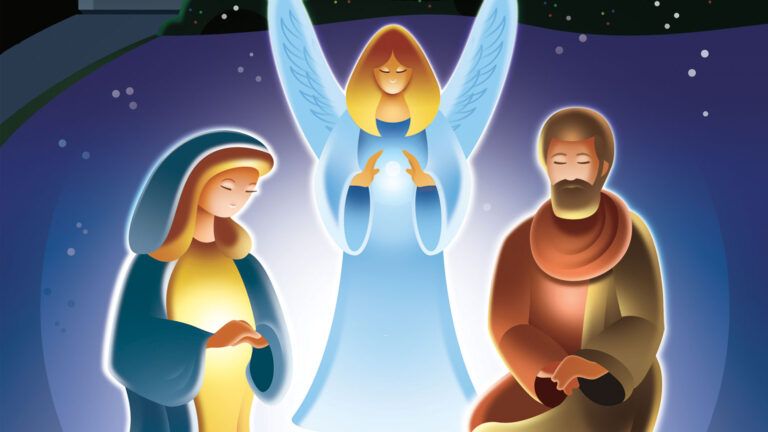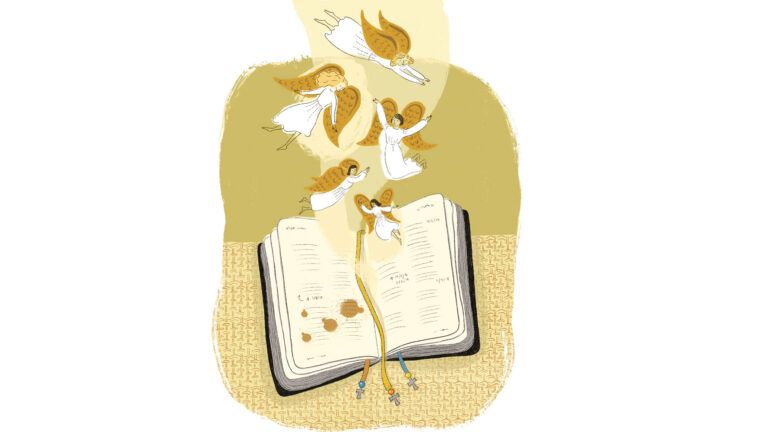Golden stars and angels. Festive lights and carols. Shoppers with bags of wrapped packages. Windows glowing with yuletide pageantry. “Oh,” a friend said to me, “aren’t they wonderful, all these warm familiar symbols? Christmas wouldn’t be Christmas without them!”
I had to smile a little. Let me tell you why.
Not too long ago my wife, Ruth, and the other members of our family, our three children and spouses with assorted grandchildren, persuaded me that it would be a great adventure to spend Christmas in a completely different setting, one with a totally new atmosphere.
“What if we went to Africa,” they said with great excitement, “and lived in tents in one of those game parks surrounded by all those wonderful animals? Wouldn’t a faraway Christmas be exciting? Wouldn’t it be terrific? Wouldn’t family ties be strengthened by such a unique experience?”
I protested feebly that perhaps someone who had passed his 89th birthday, as I had, might find living in a tent surrounded by wild animals a bit strenuous. But no one seemed to be listening. “You’ll love every minute of it,” Ruth assured me. And so on this high note of excitement and enthusiasm we made our preparations to go to East Africa.
The Samburu Game Park in Kenya was indeed far away. And indeed it was different. Ruth and I shared a tent pitched near a fast-flowing brown river. In tents on either side were our children and grandchildren.
There was heat and dust and burning sun. At night the forest resounded with barks, screeches, splashes and, once, just behind our tents, a grunting sound that they told me next day had probably been made by a leopard.
So I did not sleep very well, but these unfamiliar things were not what troubled me. What troubled me was that nothing seemed like Christmas. I tried to shrug off the feeling, but it persisted, a kind of emptiness, a sadness almost, a small voice that whispered, “Christmas means coming home, doesn’t it? Why have all of you chosen to turn your backs on home like this?”
I did my best to conceal such thoughts from the others, but I could not conceal them from myself. And they kept coming back, often at unexpected moments.
On the afternoon of Christmas Eve, for example, we had come back from a splendid day of viewing the animals. We had seen a beautiful herd of zebras, 76 elephants, a cheetah chasing an impala, a nursing lioness, all magnificent in their natural surroundings. Then it was time for a shower before dinner, which was a bit of an adventure too.
The camp helpers heated water, put it in a bucket, then hoisted the bucket to the top of a pole behind the tent. From there the water ran down a pipe into the rear of the tent where, standing on slats, the bather could soap and rinse himself after a fashion.
I was drying myself off when suddenly—I don’t know what triggered it—I found myself remembering long ago Christmases spent in Cincinnati during my impressionable boyhood years. The city was full of people of German descent, and the Germans are very sentimental about Christmas.
I found myself recalling Fountain Square as it looked on Christmas Eve; I thought it the biggest, brightest, most beautiful place I had ever seen. The Christmas tree was enormous, and the streets were alive with carols, many sung in German: “Stille Nacht” and “O Tannenbaum.”
I could see myself walking with my father, my small hand in his big one, the snow crunching under our feet. Up on East Liberty Street, where we lived, my mother always had a tree with real candles on it. The smell of those tallow candles mingled with the scent of fir, an aroma unlike any other.
Be inspired each day! Order Daily Guideposts 2021!
Now, standing in our little tent with the vastness of Africa all around me, I remembered that wonderful smell, and I missed it terribly.
We had been told there would be a special dinner out for us that evening. Even this did not cheer me; I thought it might be an artificial occasion with everyone trying too hard to be merry.
When I came out near dinnertime I saw that in the eating tent a straggly brown bush had been set up, decorated with small colored lights and some tinsel and red ribbon. I thought of the great tree in Fountain Square and the even greater one in Rockefeller Center in New York City, or the magnificent one on the great lawn of the White House.
We were called to the edge of the river, where chairs had been set up for all of us so that we could see, on the other side, two herders guarding their cattle, their spear tips gleaming in the gathering dusk. And at that peaceful, almost timeless sight, I felt something stir within me, for I knew that these herders and their charges came from a long line that had not changed in thousands of years.
They belonged to their landscape just as the shepherds on the hills outside Bethlehem belonged to theirs. And at that moment one of our grandchildren began to sing, hesitantly, tentatively, “O Little Town of Bethlehem.” Gradually others joined in: “Hark! The Herald Angels Sing,” and then “Joy to the World!”
Soon we were all singing, and as we sang, everything seemed to change; the sense of strangeness was gone. I looked around the group, our children, their children, singing songs, sharing feelings that in a very real way went back almost two thousand years to that simple manger in a simple town, with the herders standing by in a parched and primitive land.
Then someone began to read the immortal story from Luke: “And there were in the same country shepherds abiding in the field, keeping watch over their flock by night…” As the story went on I thought, How wonderful and simple it is, so wonderful and simple that only God could have thought of it.
I found myself remembering a radio talk given many years ago by Sam Shoemaker, a much-loved pastor and a good friend of mine. In it Sam was speculating on what God the Father might have said to Jesus His Son on the night before Jesus left Him to go down to earth.
He imagined Father and Son conversing much as a human boy and his father might do before the son leaves home to go out into the world. Only Sam with his great simplicity could picture it this way.
According to this conception, God might have said, “Son, I hate to see You go. I sure am going to miss You. I love You with all My heart. But I do want You to go down to earth and tell those poor souls down there how to live and point them to the way that will lead them back home.”
Sam said he thought the last thing God said to Jesus was, “Give them all my love.” Now that is simple, but it’s human and it’s divine.
So when the carols and the Bible reading ended and we walked back to the eating tent for our dinner, I knew with a complete sense of peace that where Christmas is concerned, surroundings do not matter, because the Spirit of Jesus is everywhere, knocking on the door of our hearts, asking to be taken in.
The festive lights and the gifts and the ornaments are fine, but they are only a setting for the real jewel: the birth of a Baby that marked the descent of God Himself to mankind. That is where the deepest meaning of Christmas lies. And it can be found in that simple sentence: “Give them all my love.”
This story first appeared in the December 1990 edition of Guideposts.





